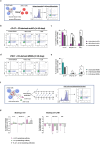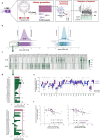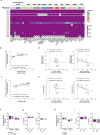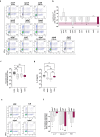AIEC-dependent pathogenic Th17 cell transdifferentiation in Crohn's disease is suppressed by rfaP and ybaT deletion
- PMID: 39069911
- PMCID: PMC11290758
- DOI: 10.1080/19490976.2024.2380064
AIEC-dependent pathogenic Th17 cell transdifferentiation in Crohn's disease is suppressed by rfaP and ybaT deletion
Abstract
Mucosal enrichment of the Adherent-Invasive E. coli (AIEC) pathotype and the expansion of pathogenic IFNγ-producing Th17 (pTh17) cells have been linked to Crohn's Disease (CD) pathogenesis. However, the molecular pathways underlying the AIEC-dependent pTh17 cell transdifferentiation in CD patients remain elusive. To this aim, we created and functionally screened a transposon AIEC mutant library of 10.058 mutants to identify the virulence determinants directly implicated in triggering IL-23 production and pTh17 cell generation. pTh17 cell transdifferentiation was assessed in functional assays by co-culturing AIEC-infected human dendritic cells (DCs) with autologous conventional Th17 (cTh17) cells isolated from blood of Healthy Donors (HD) or CD patients. AIEC triggered IL-23 hypersecretion and transdifferentiation of cTh17 into pTh17 cells selectively through the interaction with CD-derived DCs. Moreover, the chronic release of IL-23 by AIEC-colonized DCs required a continuous IL-23 neutralization to significantly reduce the AIEC-dependent pTh17 cell differentiation. The multi-step screenings of the AIEC mutant's library revealed that deletion of ybaT or rfaP efficiently hinder the IL-23 hypersecretion and hampered the AIEC-dependent skewing of protective cTh17 into pathogenic IFNγ-producing pTh17 cells. Overall, our findings indicate that ybaT (inner membrane transport protein) and rfaP (LPS-core heptose kinase) represent novel and attractive candidate targets to prevent chronic intestinal inflammation in CD.
Keywords: AIEC; Crohn’s disease; IL-23; pathogenic Th17 cells.
Conflict of interest statement
No potential conflict of interest was reported by the author(s).
Figures






References
Publication types
MeSH terms
Substances
LinkOut - more resources
Full Text Sources
Medical
